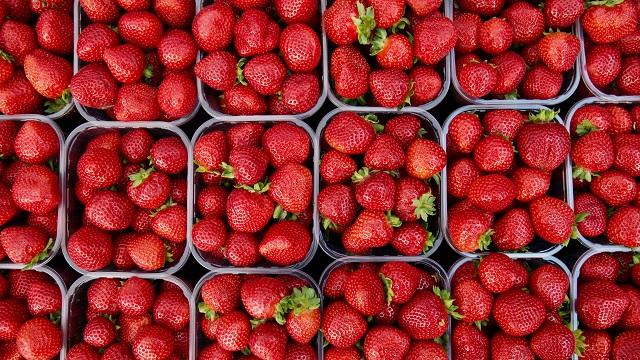It’s time to bring food defence to the table
Posted By Rebecca Hoile and Paul Barnes on September 26, 2018 @ 14:37

Food contamination has been a regular feature [1] in news headlines over the past fortnight.
The discovery of needles in strawberries and other fruit has been the main cause of concern, with incidents spreading across the country and overseas.
The food industry has long focused on food safety and assuring the quality of its products. These assurance systems primarily use Hazard Analysis Critical Control Point (HACCP) principles which are accepted and used globally [2] to reduce the incidence of major food-borne disease outbreaks and have proven effective against accidental contamination.
Yet food safety practices are not sufficient to protect the food chain from deliberate contamination. Food defence [3] is the protection of food and drink from deliberate contamination with chemical, biological, radiological substances or other hazardous materials—including foreign bodies like needles—and requires additional safeguards, procedures and controls to mitigate potential risk. Food defence is different to food safety.
Recognition of this difference is well established internationally. Deliberate contamination of food was the focus [4] of the Food Defense Symposium organised by INTERPOL and the FBI in May 2016.
At the meeting it was acknowledged that ‘insider threat’ is one of the biggest challenges to overcome to prevent intentional tampering and contamination of food systems. While external security measures and HACCP practices [3] generally work well to protect against lapses in food quality and unintentional food contamination, vulnerabilities inside the ‘food chain’ system were noted as significant issues.
Food defence strategies focusing on assessing vulnerability as part of broader risk management plans were one of the key topics covered during the food defence conference [5] held in May in Minneapolis.
Deliberate acts against food and the supply chain can take on a few different forms including extortion, where a threat to contaminate a product may be made; economically motivated adulteration, which may include the addition of a contaminating substance; and malicious contamination, where a product has been contaminated with the intention to cause harm to the industry or human health.
A contamination crisis involving Fonterra, a global dairy company based in New Zealand, is a relevant example [6]. In late 2014, the company received threat letters, accompanied by small packets of milk powder, which subsequently tested positive for the widely-used agricultural pesticide 1080. The letters contained implied threats of wider contamination of baby formula by a declared date unless the use of 1080 ceased.
The likelihood of widespread contamination of milk products was deemed very low but the incident triggered the recall of products and extensive testing to secure the food chain, at a cost of $A25 million. The scare also threatened dairy industry exports—particularly to China—and New Zealand’s food security reputation. In an interesting twist, the perpetrator [7] was found to be a producer of an alternative pesticide and stood to benefit financially if 1080 was banned.
In 2016, reports surfaced in relation to adulterated Italian olive oil, with investigations demonstrating that well-known brands of Italian extra virgin olive oil were neither of Italian origin nor virgin and instead used low-grade oils and food colouring to pass off as the real thing.
A lucrative business, backed by criminal networks, was dismantled by Italian authorities who arrested 33 men [8] and seized a total of $42 million in assets. At the time the profit margin in fake olive oil [9] was higher than cocaine.
It’s no surprise that concerns were raised at the INTERPOL symposium about the increasing threats from criminals and terrorists to food products [10], grocery stores [11] and other ‘soft’ targets, and the need for developing comprehensive risk-based strategies.
The recent strawberry tampering incidents have been described as ‘food terrorism [12]’ by Strawberries Australia. This view seems a reflection not only of the criminality of the act but also the consequential impact on local and export markets and the wellbeing of consumers.
Food defence is regarded internationally as a specialised risk management framework that works alongside established food safety practices. Its convergence of techniques and practices from policing, applied science and national security perspectives may be a relatively new preventive focus for Australia but it’s one we need to consider implementing.
Product tampering is not new but we are facing the new reality of attacks on our own food supply that may have taken us into deeper water, beyond reliance on tried and proven ‘food safety’ standards and into a murkier world of food insecurity. It seems time to bring ‘food defence’ to our tables.
Article printed from The Strategist: https://aspistrategist.ru
URL to article: /its-time-to-bring-food-defence-to-the-table/
URLs in this post:
[1] regular feature: http://www.abc.net.au/radionational/programs/breakfast/food-defence-strategies-under-scrutiny/10280458
[2] used globally: https://www.fda.gov/food/guidanceregulation/haccp/
[3] Food defence: https://onlinelibrary.wiley.com/doi/full/10.1111/1750-3841.13256
[4] focus: https://www.interpol.int/News-and-media/News/2016/N2016-064
[5] food defence conference: http://www.thefooddefenseconference.com/training/
[6] example: http://www.abc.net.au/news/rural/2015-03-10/blackmailers-threaten-to-poison-new-zealand-milk/6294854
[7] perpetrator: http://www.abc.net.au/news/2016-03-23/new-zealand-businessman-jailed-over-baby-formula-threat/7271550
[8] arrested 33 men: https://www.oliveoiltimes.com/olive-oil-business/italy-arrests-33-accused-olive-oil-fraud/55364
[9] fake olive oil: https://www.oliveoiltimes.com/olive-oil-business/europe/researchers-proposes-new-tool-against-fraud/63363
[10] food products: https://www.standard.co.uk/news/world/isis-fanatics-planned-to-feed-poisoned-icecream-to-kindergarten-kids-before-bombing-nursery-a3408246.html
[11] grocery stores: https://www.newsweek.com/isis-supporters-call-poisoning-grocery-stores-us-and-europe-660750
[12] food terrorism: https://www.news.com.au/lifestyle/food/food-warnings/first-contaminated-strawberries-found-in-sydney-as-coles-removes-qldgrown-punnets-from-shelves/news-story/dcfb8c807e747032b0234156f70bf2c7
Click here to print.